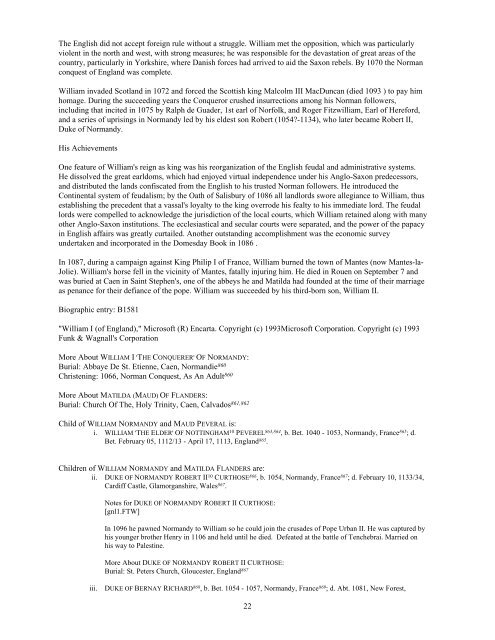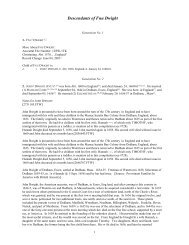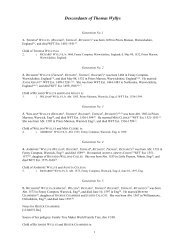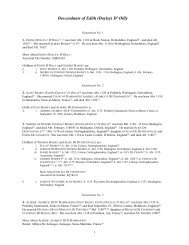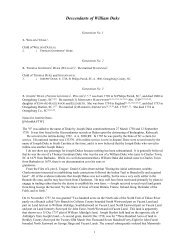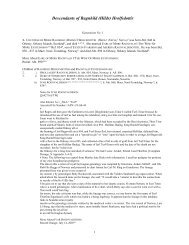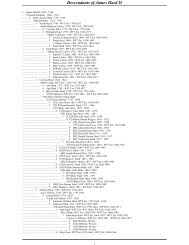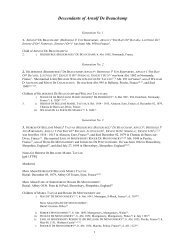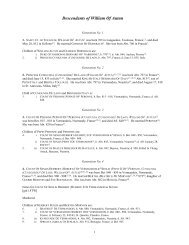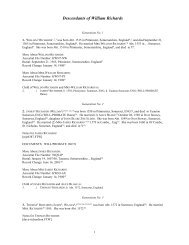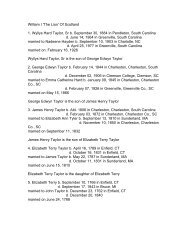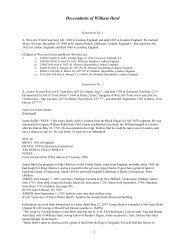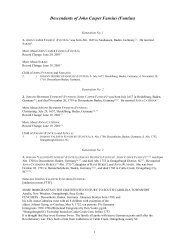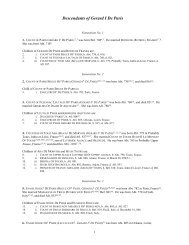Aethelwulf Of England.pdf - GBLCreations
Aethelwulf Of England.pdf - GBLCreations
Aethelwulf Of England.pdf - GBLCreations
Create successful ePaper yourself
Turn your PDF publications into a flip-book with our unique Google optimized e-Paper software.
The English did not accept foreign rule without a struggle. William met the opposition, which was particularly<br />
violent in the north and west, with strong measures; he was responsible for the devastation of great areas of the<br />
country, particularly in Yorkshire, where Danish forces had arrived to aid the Saxon rebels. By 1070 the Norman<br />
conquest of <strong>England</strong> was complete.<br />
William invaded Scotland in 1072 and forced the Scottish king Malcolm III MacDuncan (died 1093 ) to pay him<br />
homage. During the succeeding years the Conqueror crushed insurrections among his Norman followers,<br />
including that incited in 1075 by Ralph de Guader, 1st earl of Norfolk, and Roger Fitzwilliam, Earl of Hereford,<br />
and a series of uprisings in Normandy led by his eldest son Robert (1054?-1134), who later became Robert II,<br />
Duke of Normandy.<br />
His Achievements<br />
One feature of William's reign as king was his reorganization of the English feudal and administrative systems.<br />
He dissolved the great earldoms, which had enjoyed virtual independence under his Anglo-Saxon predecessors,<br />
and distributed the lands confiscated from the English to his trusted Norman followers. He introduced the<br />
Continental system of feudalism; by the Oath of Salisbury of 1086 all landlords swore allegiance to William, thus<br />
establishing the precedent that a vassal's loyalty to the king overrode his fealty to his immediate lord. The feudal<br />
lords were compelled to acknowledge the jurisdiction of the local courts, which William retained along with many<br />
other Anglo-Saxon institutions. The ecclesiastical and secular courts were separated, and the power of the papacy<br />
in English affairs was greatly curtailed. Another outstanding accomplishment was the economic survey<br />
undertaken and incorporated in the Domesday Book in 1086 .<br />
In 1087, during a campaign against King Philip I of France, William burned the town of Mantes (now Mantes-la-<br />
Jolie). William's horse fell in the vicinity of Mantes, fatally injuring him. He died in Rouen on September 7 and<br />
was buried at Caen in Saint Stephen's, one of the abbeys he and Matilda had founded at the time of their marriage<br />
as penance for their defiance of the pope. William was succeeded by his third-born son, William II.<br />
Biographic entry: B1581<br />
"William I (of <strong>England</strong>)," Microsoft (R) Encarta. Copyright (c) 1993Microsoft Corporation. Copyright (c) 1993<br />
Funk & Wagnall's Corporation<br />
More About WILLIAM I 'THE CONQUERER' OF NORMANDY:<br />
Burial: Abbaye De St. Etienne, Caen, Normandie 860<br />
Christening: 1066, Norman Conquest, As An Adult 860<br />
More About MATILDA (MAUD) OF FLANDERS:<br />
Burial: Church <strong>Of</strong> The, Holy Trinity, Caen, Calvados 861,862<br />
Child of WILLIAM NORMANDY and MAUD PEVERAL is:<br />
i. WILLIAM 'THE ELDER' OF NOTTINGHAM 10 PEVEREL 863,864 , b. Bet. 1040 - 1053, Normandy, France 865 ; d.<br />
Bet. February 05, 1112/13 - April 17, 1113, <strong>England</strong> 865 .<br />
Children of WILLIAM NORMANDY and MATILDA FLANDERS are:<br />
ii. DUKE OF NORMANDY ROBERT II 10 CURTHOSE 866 , b. 1054, Normandy, France 867 ; d. February 10, 1133/34,<br />
Cardiff Castle, Glamorganshire, Wales 867 .<br />
Notes for DUKE OF NORMANDY ROBERT II CURTHOSE:<br />
[gnl1.FTW]<br />
In 1096 he pawned Normandy to William so he could join the crusades of Pope Urban II. He was captured by<br />
his younger brother Henry in 1106 and held until he died. Defeated at the battle of Tenchebrai. Married on<br />
his way to Palestine.<br />
More About DUKE OF NORMANDY ROBERT II CURTHOSE:<br />
Burial: St. Peters Church, Gloucester, <strong>England</strong> 867<br />
iii. DUKE OF BERNAY RICHARD 868 , b. Bet. 1054 - 1057, Normandy, France 869 ; d. Abt. 1081, New Forest,<br />
22


